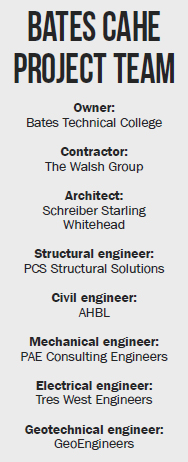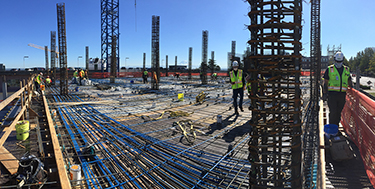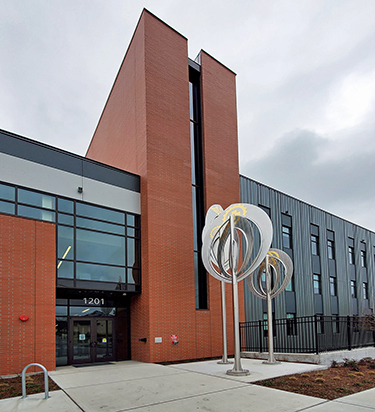|
Subscribe / Renew |
|
|
Contact Us |
|
| ► Subscribe to our Free Weekly Newsletter | |
| home | Welcome, sign in or click here to subscribe. | login |
Construction
| |
 |
April 1, 2022
A boost for health care education at Bates Tech
PCS Structural Solutions

Hendel
|

Plank
|
In January, classes opened at the new Center for Allied Health Education (CAHE), a $35 million, 70,000-square-foot addition to Bates Technical College’s campus in downtown Tacoma. CAHE packs a breathtaking array of premier health care education in an urban setting. Students receive practical, hands-on and industry-specific education and training in a leading-edge facility.
Educating a workforce for the health care industry is an imperative. In Pierce County alone, health care service providers are the county’s largest private employers, according to Washington State Employment Security Department. Even more compelling, a shortage of health care workers throughout the state has only been exacerbated as a result of COVID-19 pandemic. And if a Washington State Nurses Association poll indicating that “49% of health care workers said they’re likely to leave the profession in the next few years” is any indication, the health care industry may experience a continued and significant labor exodus. The new center at Bates Technical College provides much needed space for programming to equip a modern workforce and represents a significant part of the state-wide push for expanded reinvestment in health care education.
The CAHE design-build project team was challenged to expand programming within a dense urban site, deliver an efficient parking layout, provide open spaces for labs and classrooms, and design for future flexibility. The project was in construction when COVID-19 caused the first stay-at-home order in March 2020. The team adapted nimbly, moving to efficiently manage city review and permitting processes and mitigate the impact of potential stalls on materials supplies.
BUILDING DESIGN
The CAHE is an industrial-style, four-story structure constructed with post-tensioned concrete slabs and concrete walls and columns. The building was designed to meet LEED Silver certification.
From the street, the structure’s scale is unimposing, fitting in gently to the urban neighborhood, but it surprises with the amount of programming it provides. The layout accommodates ample open spaces for labs and classrooms, nearly doubling Bates’ student capacity for its health sciences programs. Ground-level parking was provided to retain access for commuter students, and existing public transportation access was carefully maintained.
To facilitate open space design, the lateral system for the building consists of two core walls — one at the north and south ends of the building. This configuration allows for a long, 200-foot span between the cores. Columns were positioned at exterior and corridor walls to allow for easy space reconfiguration and program flexibility.
Close collaboration with the geotechnical consultant, GeoEngineers, was required for the demolition of the existing West Annex building and foundations. CAHE takes the old annex’s place and neatly connects to the main campus building by crossing over the intersection of a street that had originally bisected the campus. A new exterior courtyard tucks in at the newly enclosed space behind CAHE, helping to create a campus feel.
BUDGET, SCHEDULE STRATEGIES
High steel costs and supply chain issues were managed early in design, and the team considered multiple framing systems. Post-tensioned concrete proved the best choice since it allowed the contractor to self-perform more of the work and control budget in light of shortages and spiraling costs.
However, budget shortfalls required creative solutions to provide for a 15-foot-high retaining wall on the north side of the structure and the new parking ramp. To mitigate costs, the foundation of an existing gravity wall was salvaged and the foundations bulked up, repurposing it for use as a cantilevered retaining wall. The team worked closely with the city since the wall supported a functioning piece of Yakima Avenue and sat within the public right of way. Likewise, an existing vehicular ramp, previously used within the old building, was partially demolished, reinforced and extended to maintain rooftop parking access for the adjoining building. The reuse was not only a sustainable use of materials, but effectively cut the cost of the new ramp in half.

Cost-effective finishing alternatives provided the balance of the necessary budget: Instead of covered columns and dropped ceilings, exposed columns and open ceilings were used, saving on cost and enhancing the industrial vibe of the building.
A structure of this significant size and complexity required multiple city departments for the review and permitting process. PCS worked with the city of Tacoma to submit early foundation and ramp packages. They were quickly approved, enabling the contractor to get started earlier, saving months of schedule. In addition, the team determined that submittals would need to be prioritized to get ahead of potential supply issues. Prioritized submittals were reviewed earlier than normal so that materials could be ordered well in advance.
The Bates Technical College Center for Allied Health Education project is an enormous success. The environment of design-build collaboration helped the team navigate under extraordinary circumstances to deliver a critical community project. Classes opened in January, and a ribbon cutting is planned for April. In timing that proved prescient, Bates Technical College Allied Health Education Center provides opportunities for families to earn living wages and thrive in our communities. Graduating professionals will help bolster a weary industry labor force and contribute to a robust downtown economy.
Valerie Hendel is a marketing coordinator, and Jared Plank is a senior associate at PCS Structural Solutions, a single-discipline structural engineering firm with offices in Seattle, Tacoma and Portland.
Other Stories:
- Don’t ignore new compliance requirements
- Designing a healing river in Sequim
- The lab building of the future is NEXT
- What it takes to build health and science projects
- The challenge of fighting climate change Health
- It’s time to rethink health care design
- A cancer care model with all the right amenities




